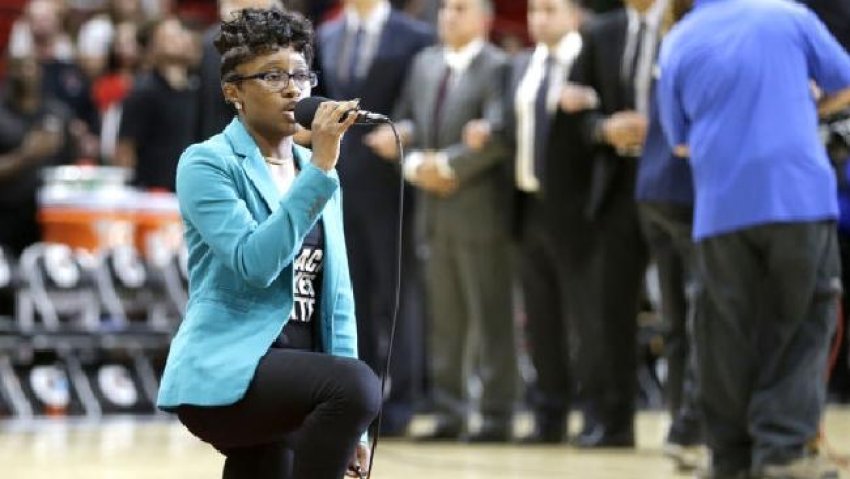
Singer Denasia Lawrence knelt while performing the national anthem at a Miami Heat basketball game on October 21 and opened her jacket to reveal a “Black Lives Matter” T-shirt.
It was a variation on a protest that has punctuated many US sporting events in recent times against racist police violence. Like other anthem protests, the gesture by the Black singer Denasia was intended to highlight the unfair police treatment of people of colour in the United States amid ongoing killings of unarmed Black people.
The trend began in August when San Francisco NFL quarterback Colin Kaepernick knelt during the playing of the “Star-Spangled Banner” before a preseason National Football League game.
Lawrence, a social worker, wrote on Facebook that the opportunity at the preseason Heat game “was bigger than me”.
“Right now, we’re seeing a war on Black and Brown bodies — we’re being unjustly killed and overly criminalised,” she said. “I took the opportunity to sing AND kneel; to show that we belong in this country AND that we have the right to respectfully protest injustices against us.
“I took the opportunity to sing AND kneel to show that, I too, am America.”
Lawrence was not the first anthem singer to take a knee. Leah Tysse knelt while singing before a preseason Sacramento Kings game two weeks before.
Other players in various sports, at the professional, amateur and even high school levels, have taken up the protest. Some have raised their fists in a move that recalls a famous stand in support of the Black Power movement by US track and field athletes Tommie Smith and John Carlos during a medal ceremony at the 1968 Olympic Games in Mexico City.
The Heat players and coaches stood and locked arms during the anthem as they have done throughout the preseason as a show of unity.
“Throughout all of this, I think the most important thing that has come out of this is a very poignant, thoughtful dialogue,” said head coach Erik Spoelstra after his team lost to the Philadelphia 76ers. “We've had great dialogue within our walls here, and hopefully this will lead to action.”
The team said they were not aware of Lawrence’s intention to protest ahead of the game.
Professional teams and athletes who engage in such protests seem to be escaping penalties for now. But smaller and less known teams are facing mounting pressure over the peaceful protests.
Days before Lawrence’s actions, the Beaumont Bulls, comprised of 11- and 12-year-old Black middle schoolers in Beaumont, Texas, had their season cancelled by the executive board after they kept up the fight against racial injustice by kneeling during the playing of the US national anthem ahead of their games.
[Reprinted from TeleSUR English.]